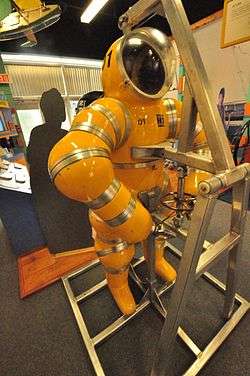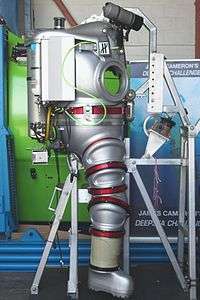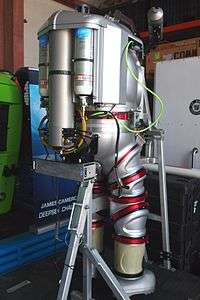Newtsuit
The Newtsuit is an atmospheric diving suit designed and originally built by Phil Nuytten.[1]

The suit is used for work on ocean drilling rigs, pipelines, salvage jobs, and photographic surveys, and is standard equipment in many of the world's navies.[2]
This aluminum hard suit has fully articulated,[3] rotary joints in the arms and legs that give the pilot a great range of mobility.[4] These joints operate freely at high pressures. At the time the suit was constructed, it was the first of its kind in this regard. The pilot can control objects and handle tools with manipulator jaws at the ends of the arms. Although the suit is certified to 300 metres (980 ft), it has been tested to 900 metres (3,000 ft).[5]
The suit operates untethered, with a thruster pack that can be fitted to the suit. This allows mobility in mid-water.[1] The Newtsuit navigates with foot controls. The left foot provides vertical control, with the right foot providing lateral control.[3] Other equipment that can be attached includes twin video cameras, colour imaging sonar, and an AMS suit monitor system that transmits information to the surface, such as CO2, HPO, O2%, depth, temperature, and cabin pressure.[3]
Communication is achieved through digital voice/data transmission via water and umbilical cable.[3]
Specifications
- Length: 162 – 193 cm (5'4" – 6’4")
- Beam: 76 cm (30")
- Weight: 275 to 378 kg (606 to 833 lb)[3]
- Weight in water: -2 to -4 kg ( - 4 to -8 lbs) flying mode[3]
- Hull: A356 cast aluminum[3]
- Propulsion: two thruster packs (constant with variable pitch)[3][3][6]
- Operational depth: 305 m (1000 ft)[3] (tested to 900 m (3,000 ft)[5])
- Power: two electric 2.25 hp (at 400 Hz) electric motors, supplied by an umbilical cord to the surface ship, 5 hour emergency supply from battery
- Life support: closed circuit rebreather, (up to 48 hours) with fan powered CO2 scrubber, and a back-up emergency rebreather.[1][3]
Emergency equipment
In the event of an emergency, the suit is equipped with the following:[3]
Exosuit
The newest generation of this type of suit is a powered exoskeleton called the Exosuit , also designed by Phil Nuytten.
 Side view of Exosuit
Side view of Exosuit Back view of Exosuit
Back view of Exosuit
References
- "NewtSuit". Vancouvermaritimemuseum.com. 2011-08-15. Archived from the original on 2011-09-27. Retrieved 2011-08-22.
- "About Nuytco - Phil Nuytten". Nuytco.com. Archived from the original on 2011-08-30. Retrieved 2011-08-22.
- "Submersible Suits - The Newt Suit". Sub-find. Archived from the original on 2011-10-01. Retrieved 2011-08-22.
- Kesling, Doug E. "Atmospheric Diving Suits – New Technology May Provide ADS Systems that are Practical and Cost-Effective Tools for Conducting Safe Scientific Diving, Exploration, and Undersea Research". In: Pollock NW, ed. Diving for Science 2011. Proceedings of the American Academy of Underwater Sciences 30th Symposium. Dauphin Island, AL: AAUS; 2011. Retrieved 2013-03-06.
- Vancouver, The (2006-08-25). "Business rises to new depths". Canada.com. Archived from the original on 2012-11-10. Retrieved 2011-08-22.
- http://courses.washington.edu/ocean102/Lex/Lex_09/Lecture2.pdf
External links
- Image and specifications of the Exosuit
- Images of other hard, atmospheric diving suit, including the WASP series
- Hashimoto, A; Takaai, Y; Nakabayashi, K; Ito, A (1996). "Life support system evaluation of the "Newtsuit" (Atmospheric Diving Suit) during a simulated work and rest cycle". Undersea and Hyperbaric Medicine Journal. Undersea and Hyperbaric Medical Society Annual Scientific Meeting. Retrieved 2011-09-21.
- Image of Canadian astronaut Julie Payette in Newtsuit